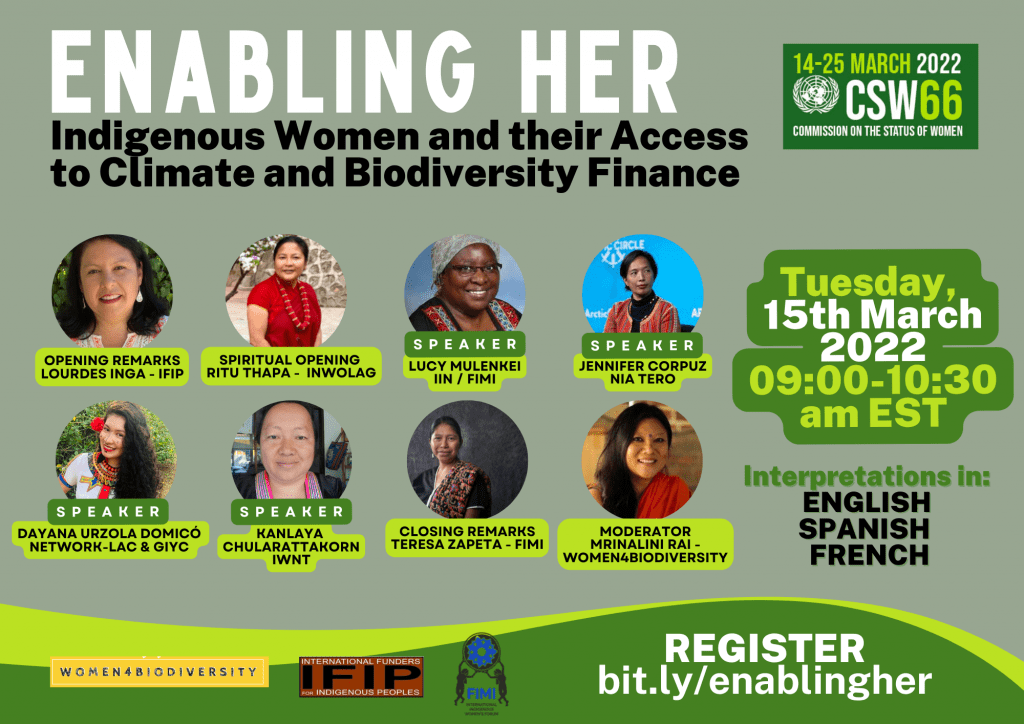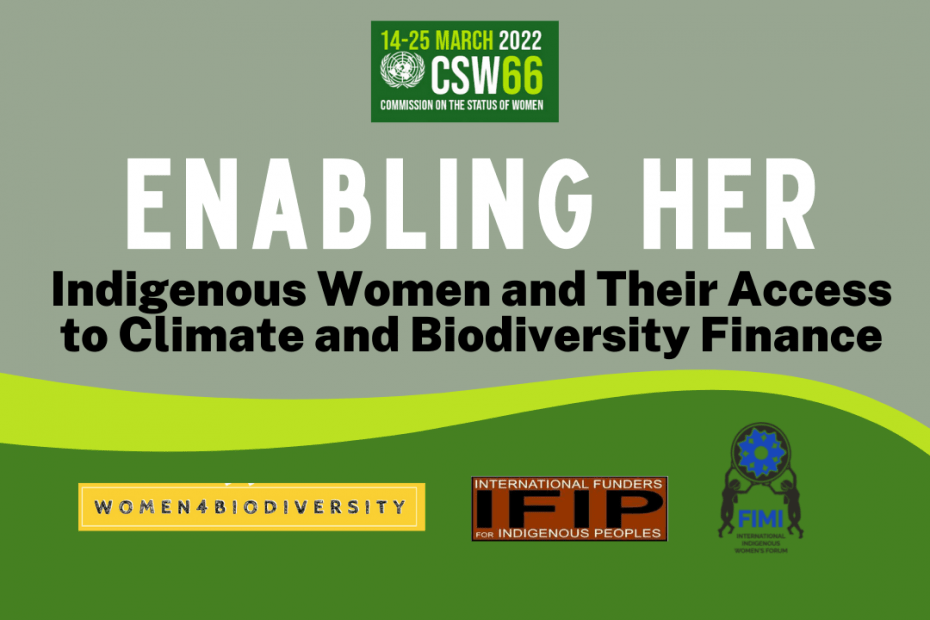Date: 15 March 2022
Time: 09:00-10:30 am EST
Language: English, Spanish, and French
Register on this link or at bit.ly/enablingher
Background
The sixty-sixth session of the Commission on the Status of Women (CSW 66) will take place from 14 to 25 March 2022. Due to the continued impact of the COVID-19 pandemic, CSW66 will take place in a hybrid format. All side events and parallel events will be fully virtual. The session will address two themes: a Priority Theme on “Achieving gender equality and the empowerment of all women and girls in the context of climate change, environmental and disaster risk reduction policies and programmes” and a Review Theme on “Women’s economic empowerment in the changing world of work (agreed conclusions of the sixty-first session)”.
According to the ILO report, there are estimated to be 476.6 million indigenous peoples and half of the population constitutes indigenous women. Although indigenous peoples have the lowest global carbon footprint, they are most impacted by climate change. Supported by numerous studies, it is undeniable that indigenous land tenure rights and a rights-based approach are an effective solution to halting deforestation, preserving the biodiversity of critical tropical forest ecosystems, sequestering carbon, and respecting indigenous peoples’ rights.
In this context, indigenous women are disproportionately experiencing the impacts of climate change and loss of biodiversity. Gender inequality limits not only women’s physical and economic mobility but also, in many places, their representation, and opportunities, making them more vulnerable to growing environmental tensions and to the environmental crisis that presents multiple hazards, above all for the poorest women, the subordinate ones, including those who remain unrepresented in public policy. Indigenous, peasant, and rural women, along with most women bear an even greater environmental crisis burden in this regard, due to the historic and ongoing impacts of colonialism, racism, and inequality.
In terms of indigenous peoples and their climate and biodiversity financing, a recent study by Rainforest Norway found that indigenous people have received less than one per cent of climate financing. And much of this funding was directed through intermediaries and this includes both public and private. This <1% in climate finance represents a huge gap considering indigenous peoples own, manage, use, or occupy over twenty-five per cent of global land area, including 50 per cent of forests and 80 per cent of forest biodiversity holding 22 per cent of all carbon stores.
Specifically, to indigenous women, while they play an important role in protecting and preserving biodiversity using their indigenous traditional knowledge they have very little or almost no access to available climate or biodiversity finance globally.
Sufficient climate and biodiversity financing would help in enabling women to effectively protect and preserve biodiversity, and better participate in biodiversity policy and decision-making.
Objectives
In this context, this virtual side event will try to:
- Bring the voices and experience of indigenous women and their role in the climate solution
- Bring the perspectives of indigenous women and funders’ community on the need and urgency of gender-friendly climate and biodiversity financing
- Understand the roles of the philanthropy community in building and developing plans and strategies in supporting indigenous women and their organizations, networks and their agencies. (What kind of accountability mechanisms need to be set to increase access?)
Speakers
Lucy Mulenkei, Indigenous Information Network (IIN) and Foro Internacional de Mujeres Indigenas (FIMI)
Dayana Urzola Domicó, Network of Indigenous Youth of Latin America and the Caribbean (LAC & GIYC)
Jennifer Corpuz, Nia Tero
Kanlaya Chularattakorn, Indigenous Women’s Network in Thailand
Opening and closing
Opening remarks: Lourdes Inga, International Funders for Indigenous Peoples (IFIP)
Spiritual opening: Ritu Thapa, Indigenous Women’s Legal Awareness Group (INWOLAG)
Closing remarks: Teresa Zapeta, FIMI
Moderator: Mrinalini Rai, Women4Biodiversity



Thank you for the initiatives. I work with indigenous women farmers in Uganda and your information has been very useful when discussing with them.